Updates
5 Powerful Herbs to Relieve Spring Allergies Naturally
Spring brings beautiful blooming flowers and trees, but it also triggers seasonal allergies for many people. Allergies can cause unpleasant symptoms such as sneezing, runny nose, itchy eyes, and congestion. While there are many over-the-counter medications available to manage these symptoms, natural remedies can also provide relief without the risk of side effects. In this article, we will explore 5 herbs that are useful for managing spring allergies.
Stinging Nettle
Stinging nettle (Urtica dioica) is a popular herb for treating allergies. It contains compounds that inhibit histamine release, which is the main cause of allergy symptoms. Histamine is a natural chemical that the body produces in response to allergens, and it causes inflammation and irritation in the body.
Stinging nettle can be consumed in various forms, including tea, tincture, or capsule. The leaves of the plant can also be used topically to relieve skin allergies. Stinging nettle tea can be made by steeping dried leaves in hot water for 5-10 minutes. You can drink up to 3 cups of nettle tea daily to manage allergy symptoms.
Butterbur
Butterbur (Petasites hybridus) is another herb that has been traditionally used for allergies. It contains compounds that reduce inflammation and block histamine release. A study published in the British Medical Journal found that butterbur was as effective as the antihistamine cetirizine in managing hay fever symptoms.
Butterbur is available in various forms, including capsules and extracts. It is important to choose a product that is labeled as “PA-free,” as some butterbur supplements contain pyrrolizidine alkaloids (PAs), which can be toxic to the liver.
Turmeric
Turmeric (Curcuma longa) is a popular spice that has been used in Ayurvedic medicine for centuries. It contains a compound called curcumin, which has anti-inflammatory and antioxidant properties. These properties make turmeric an effective remedy for allergies and other inflammatory conditions.
You can consume turmeric by adding it to your food or taking it in supplement form. Turmeric supplements are available in capsule or liquid form. It is important to choose a high-quality supplement that contains a standardized amount of curcumin.
Ginger
Ginger (Zingiber officinale) is another herb that has anti-inflammatory properties. It can help relieve allergy symptoms such as nasal congestion and sore throat. Ginger also contains compounds that inhibit the production of histamine.
You can consume ginger by adding it to your food, drinking ginger tea, or taking it in supplement form. Ginger supplements are available in capsule or liquid form. Ginger tea can be made by steeping fresh ginger root in hot water for 5-10 minutes. You can drink up to 3 cups of ginger tea daily to manage allergy symptoms.
Licorice Root
Licorice root (Glycyrrhiza glabra) is an herb that has been used in traditional medicine to treat respiratory conditions such as asthma and bronchitis. It contains compounds that have anti-inflammatory and antihistamine properties, making it an effective remedy for allergies.
Licorice root can be consumed in various forms, including tea, tincture, or capsule. Licorice root tea can be made by steeping dried roots in hot water for 5-10 minutes. You can drink up to 3 cups of licorice root tea daily to manage allergy symptoms.
Conclusion
Seasonal allergies can be a nuisance, but they don’t have to ruin your spring. Natural remedies such as stinging nettle, butterbur, turmeric, ginger, and licorice root can provide relief from allergy symptoms without the risk of side effects that come with over-the-counter medications. These herbs contain compounds that have anti- inflammatory, antihistamine, and antioxidant properties, making them effective remedies for allergies.
If you’re interested in using these herbs for allergy relief, it’s important to speak with your healthcare provider first, especially if you’re taking medications or have underlying medical conditions. Additionally, it’s important to purchase high-quality supplements or herbal products from reputable sources to ensure their safety and effectiveness.
In summary, incorporating these powerful herbs into your daily routine may help alleviate the discomfort and symptoms associated with spring allergies. Give them a try and enjoy the beautiful spring season without the sneezing and congestion


















